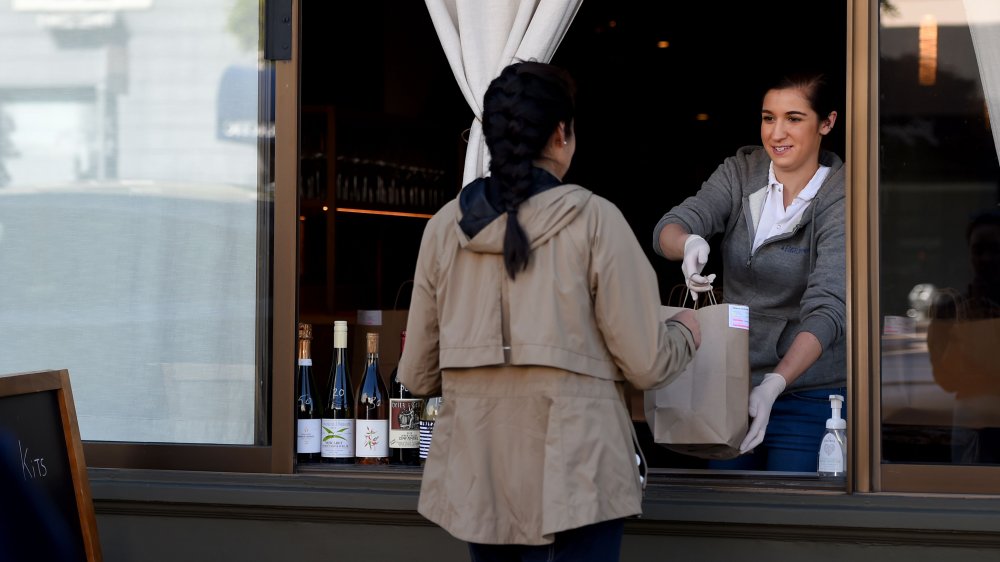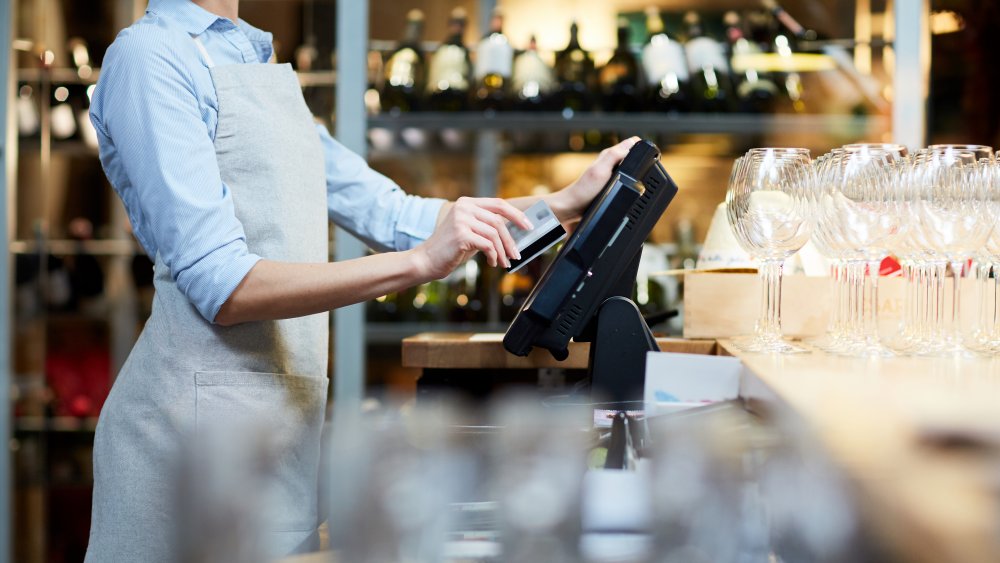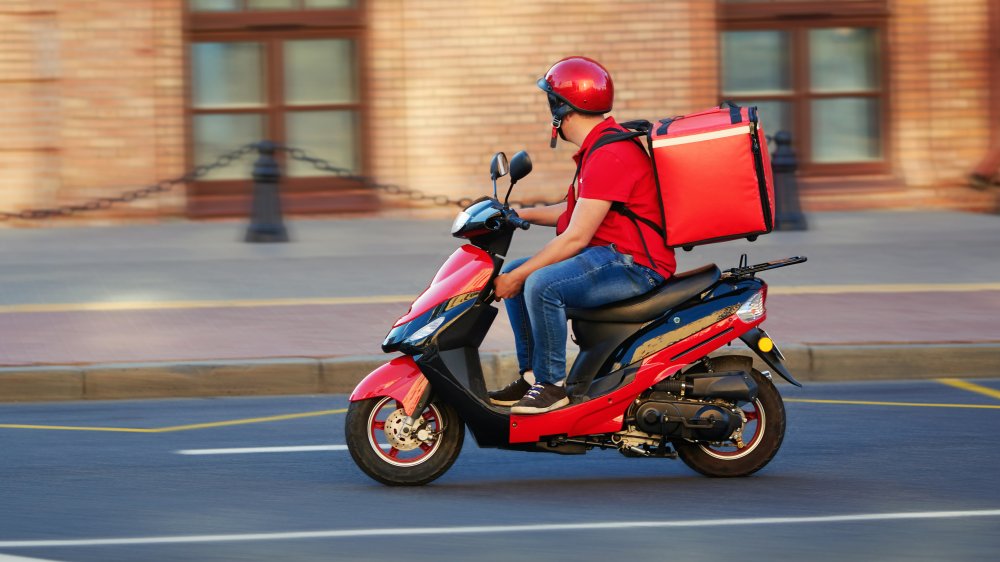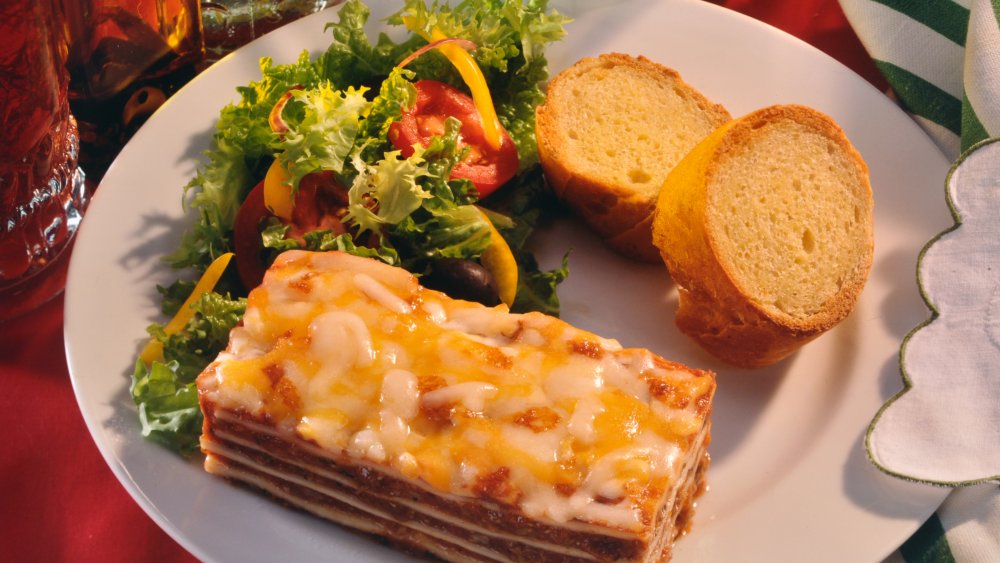The Real Reason Restaurants Are Stopping Delivery And Takeout
Restaurants across the nation have closed their doors to dine-in guests, as the coronavirus outbreak has led to many state-issued closures and limitations. This has forced eateries, even those in the fine-dining world, to shift their operations to focus on delivery and takeout only.
However, after some time trying to adjust to this new normal, some dining establishments have decided to call it quits, citing health fears. With the real and present threat of COVID-19, many restaurateurs have felt that continuing to have their employees come to work was dangerous to their well-being, especially since there are no set protocols on how to deal with this kind of unprecedented crisis.
Heather Sperling, co-owner of Botanica in Los Angeles, and her partner Emily Fiffer pivoted their restaurant into a marketplace setup that offered pantry items, fresh produce, and prepared foods. Though business was very successful, with revenue that could sustain Botanica indefinitely, the two decided to close and put a precautionary quarantine in place. "The unfortunate reality is that there are no concrete guidelines available for small restaurants about how to operate in a way that's not endangering their employees and potentially their customers," Sperling said to Eater.
Delivery and takeout are not profitable for some restaurants
Other restaurants are shutting down their delivery and takeout systems because they're just not generating enough money to justify staying open. After lagging sales with barely $1,000 in receipts, a fraction of what he would typically make, owner John Bucci of John's Roast Pork in Philadelphia threw in the towel and stopped operations completely (via The Philadelphia Inquirer).
From the perspective of Salt Lake City restaurateur Josh Rosenthal, who owns La Barba Coffee, Creek Tea, and Seabird Bar, delivery and takeout are not viable long-term solutions for most businesses. "I believe very few who attempt this will actually generate enough revenue to make it worthwhile." Rosenthal, who is also a restaurant financial consultant, told The Salt Lake Tribune. "Worse, I believe they will actually burn through more cash reserves by attempting it."
Data from industry sources seems to reinforce what Rosenthal fears. According to the New York Post, takeout business for restaurants has generally been less than 10 percent of overall sales during healthy times. After shuttering all of her New York City restaurants, Cristina Castaneda told the publication that continuing to stay open not only endangered her and her staff's health but also left her with nothing, with two bank accounts stripped down to zero within one week after the last payroll.
Even though some restaurants are slowly halting delivery and takeout, many people are opting to support their local spots in different ways while eagerly awaiting their return.
Delivery is still an option if your favorite restaurant is open
If you're lucky and your favorite bar or restaurant is still open — and will deliver — there are ways of making sure you and the restaurant staff or delivery person are safe from potential exposure. If you think no-person contact is the best way to go, CNET also says you can ask for drivers to drop food off at the door, or you can take a photo of where you want to the food to be left, then send the photo so there is no misunderstanding. It may also be good to remember that restaurants and food delivery companies don't want their staff to get sick, so they're giving drivers gloves and hand sanitizer.
Before serving takeout, move the food out of the container and onto your own plate. One things that's important to remember: "There is no evidence for COVID-19 being transmitted through food. However, the virus can live on instruments that people touch, including takeout containers and utensils. Therefore, people should wash our hands after we touch these items and before we eat or touch our faces," Leana Wen, George Washington University public health professor, tells CNET.
Most importantly, we may not consider delivery drivers as essential staff, but to those of us who are well they are critical because of the service that they do. So overtipping in this case would be the right thing to do.
How private chefs are being affected by the pandemic
Private chefs are not immune to the fallout generated by the pandemic shutdowns. DyAnne Iandoli of Long Island tells Bon Appetit that work has dried up for her too. "Initially, the families I cooked for just wanted to make sure I was following as many precautions as I could. Most of my work is in New York City. Then, it suddenly stopped. No one wanted anyone coming into their homes. I was supposed to cook for six families and I wound up only cooking for one. My last job in the city was March 13th. That's when I realized, holy cow, this is about to implode on itself," she says.
Today Iandoli says she is looking to find work in ways that she didn't imagine she could have done before. "I'm trying to make myself available in ways I wouldn't normally. I'm doing drop-off meals and delivery. I'm lowering my price and making things like lasagna, big salads, and things that are usually just for special occasions. My plan is to keep focusing on my platforms, things I know can benefit me, and pretending I have an endgame in my head," she says. She also goes on social media to upload cooking videos and tips, which has given her a bit of good news: She has seen traffic to her blog and social media increase.



